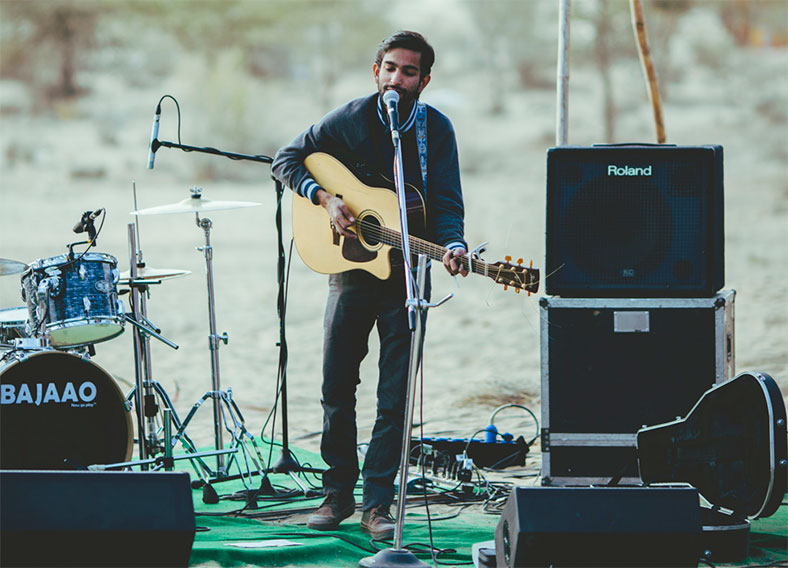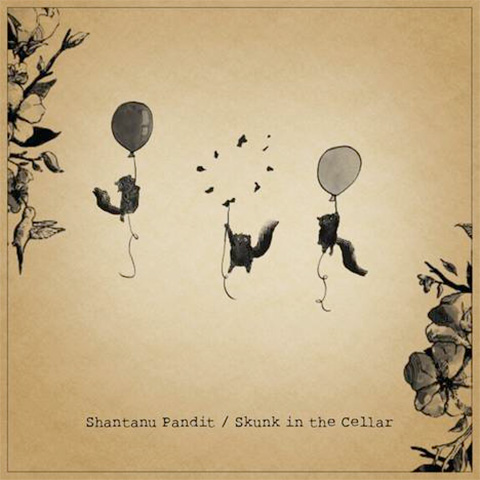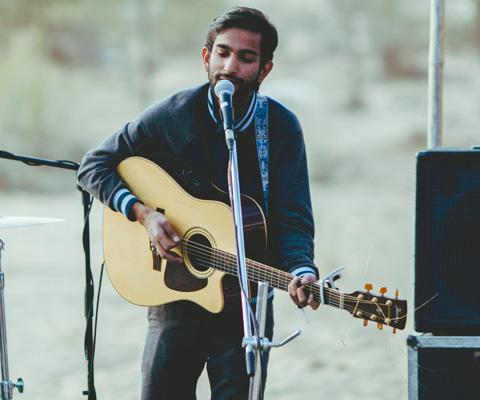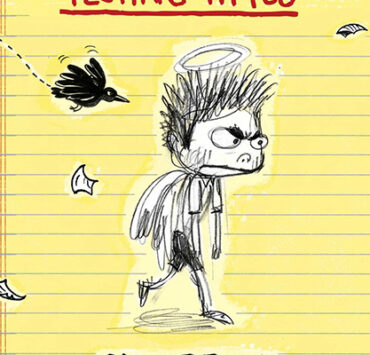Shantanu Pandit is a Delhi-based singer–songwriter and one-fourth of indie folk band RUN! It’s The Kid. He has been a professional musician for just over three years, and has already performed at a number of music festivals in India, including the NH7 Weekender, Great Indian Octoberfest, and Escape. Shantanu has also recently released his debut EP, titled Skunk in the Cellar.
We spoke to him in an exclusive interview about the EP, comparisons with Bob Dylan, and his take on the independent music scene in India. Read on for excerpts—

“The first song I ever wrote was a folk song.”
You are relatively new to the Indian music scene, and yet you’ve already garnered quite a fan following thanks to your performances at festivals such as the NH7 Weekender and Escape.
Yes, a few good things have happened, but there’s a bunch of festivals I haven’t played and [there is] tons more to do.
Was it hard for you to book slots at these festivals, being a newcomer?
Having management helps. Also, the fact is, there aren’t too many people involved in the Indian indie music scene, from the people that come to watch and who follow indie music, to the people involved in its presentation. A lot of regional festival organisers end up booking the same acts, because, in my opinion, there isn’t enough quality music to choose from—when you’re being region-specific, at least.
What drew you to folk music? Considering that the genre has a very niche audience and is not considered to be very marketable by major labels these days, how do you see yourself growing as an artist?
The first song I ever wrote was a folk song. Whether [or not] it caters to a niche audience or that it doesn’t sell cannot affect my natural tendency towards folk music. I’m writing better songs now, so I guess that means I’m growing.
Your style of music is often thought of being similar to Bob Dylan’s, to the extent that people sometimes think that your songs are Dylan covers. Do you take that as appreciation or criticism? Do you feel that it confines you as a songwriter or musician?
I’d consider it [to be] adverse criticism. Anyone who listens to my songs and thinks they’re Dylan covers obviously hasn’t really listened to Dylan. I used to get it a lot before, because of the whole harmonica stand, and traditional folk style of playing. But I don’t even sing with my whole throat anymore, and it’s been ages since I’ve written harmonica parts for a song. It obviously didn’t confine me because I’ve moved past it. Even Dylan moved past it.

“The songs cater to a pensive, weighed-down state of mind.”
Could you tell us about your recently released debut EP Skunk in the Cellar?
Skunk in the Cellar is a collection of five songs in the form of an EP, and it is my first official release. All five of them are love songs. They’re soft, down tempo, and minimal in terms of arrangement and sound. The songs cater to a pensive, weighed-down state of mind.
Is there a process you follow when you write your songs?
It’s pretty basic. My songs are minimal, organic folk songs, with simple arrangements, all on guitar. Sometimes, I write a lyric first based on metre and rhyme, and I write the music to it afterwards. Sometimes, [it works] the other way ‘round, that is, to write a lyric to a guitar melody. Sometimes, I prefer to do them both simultaneously, allowing the vocal melody and guitar line to determine each other, and to pen down the words as I proceed. It varies from song to song.
You started your music journey as a solo artist and now you are also a part of RUN! It’s the Kid. How do you go about juggling the roles of a solo artist and a band member?
I write songs differently when I write for the Kid. I keep the dynamic of a rhythm section in mind, leading to slightly more elaborate arrangements, with stops and cool time signatures, etc. Also, my bandmate Dhruv Bhola takes part in the songwriting process for RUN! It’s the Kid. My preference is dependent on the environment. If it’s a small room or theatre with an intimate setting, I’d rather play my solo set, or even some of the band’s songs stripped down, but if it’s a festival gig or a large outdoor arena, I’d rather play with the band.
The independent music scene in India has improved immensely over the last decade. Some people even consider it to be the best time to be an indie musician in India. Do you agree?
There’s tons and tons of problems in the music scene over here. I could name them all individually, but the truth is, they all point to a single problem—there’s just not enough people involved in the indie music scene. Not even a fraction of the population of the country is aware of it. Music for the local person in India is synonymous with Bollywood film soundtracks. Moreover, only a fraction of the small niche of people who are aware of it, actively contribute and support the scene. There’s sponsors and stuff, but there will never be enough money in a music scene until there are enough people actively taking part in it. Even if everyone who came out to watch a gig bought one beer, it would make a difference, but people here cringe at the thought of spending ₹300-400 for a pint, because they can get it at ₹60 from a theka. It’s this attitude that ends up affecting the venue owners and artists, because there’s barely any money in any of it. And since there’s barely any money, people need to compromise on many essentials and put on half-ass initiatives. This affects the growth of the music scene profoundly.








